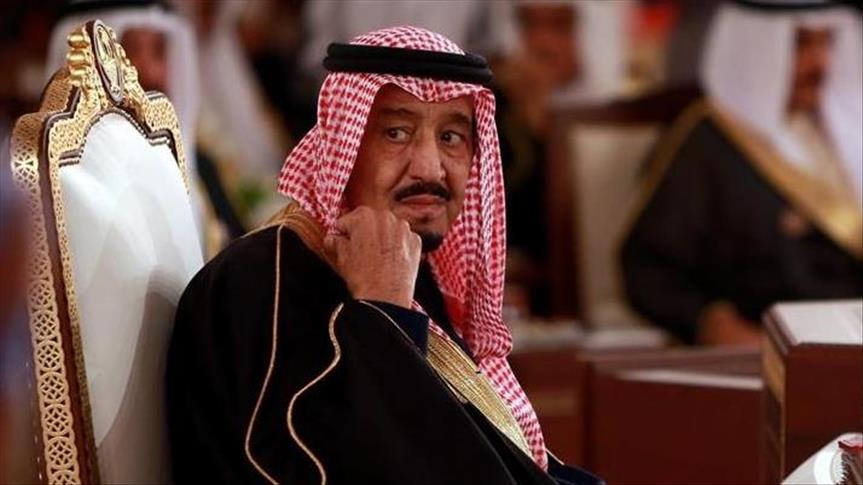Saudi Arabia's King Salman: One year on the throne
After one year in power, Saudi Arabia's King Salman continues to face a host of challenges both foreign and domestic

Suudi Arabistan
RIYADH, Saudi Arabia
One year has passed since King Salman bin Abdel-Aziz succeeded King Abdullah bin Abbdulaziz -- who died on Jan. 23, 2015 -- as monarch of Saudi Arabia.
Last year saw King Salman reform the political hierarchy within the House of Saud and take on several domestic reforms. It also saw major changes in the country’s foreign policy, including better relations with Turkey and worsening relations with Iran.
Sweeping reform
Domestically, King Salman issued 65 royal decrees in the first 100 days of his rule, which were considered some of the most sweeping in the kingdom’s history.
In April of last year, he carried out a major cabinet reshuffle, dismissing Prince Muqrin bin Abdulaziz as crown prince and appointing Prince Muhammad Bin Nayef, 56, as both crown prince and interior minister.
He also appointed his son, Prince Mohammad bin Salman, to the post of defense minister.
The dramatic move has served to bolster the position of the House of Saud’s second generation within the country’s power hierarchy.
‘Decisive’
Moves like these appear to have cemented the new king’s reputation as a "decisive" leader.
In a similar vein, after 107 Muslim pilgrims were killed last September when a crane collapsed in Mecca’s Grand Mosque, King Salman banned the board of directors of the Bin Laden Group -- which had been overseeing construction of the site -- from leaving the country until investigations were concluded.
The group was later held responsible for the accident and has since been forced to pay compensation out to the victims’ families.
Under King Salman, the country has also seen major social reforms. Last December, Saudi women, for example, were allowed to vote in -- and contest -- municipal elections for the very first time, with 21 female candidates ultimately winning seats.
And regarding the country’s Shia-Muslim minority, the king has stressed several times -- including in his first televised speech last March -- the importance of "national unity" and "equality between citizens".
Economy
On the economic level, meanwhile, the recent decrease in international oil prices has posed a major challenge to the new king -- and led to an $87-billion deficit in the country’s budget for 2016.
While King Salman has not yet come up with a solution, he stated last December that high international oil prices in recent years had allowed Saudi Arabia to "build up a national reserve that would allow it to weather sudden price decreases".
Terrorism
Regarding the international fight against terrorism, last year saw a number of Saudi security personnel targeted in terrorists acts, the perpetrators of which were eventually apprehended.
Last July, the Saudi authorities announced they had detained 431 members of Daesh terrorist cells allegedly operating in the country.
And in April, the authorities announced that they had successfully foiled a planned suicide operation targeting the U.S. embassy in Riyadh.
Over the past four months alone, the authorities announced the arrest of 93 people, including 81 Daesh members who had allegedly been planning to target security checkpoints and residential areas in the kingdom.
Yemen, Syria
On the foreign policy front, the challenges facing Saudi Arabia are represented mainly in its fractious relations with Iran and its involvement in the ongoing Syrian and Yemeni conflicts.
Seven weeks after coming to power, King Salman gave the green light to a Saudi-led campaign aimed at reversing the Shia Houthi militia’s military gains in Yemen.
In September of 2014, the Houthis overran Yemeni capital Sanaa before capturing additional parts of the country, forcing Saudi-backed President Abd Rabbu Mansur Hadi and his government to flee to Riyadh.
In March, Saudi Arabia and its Arab allies began an extensive air campaign.
Hadi has since returned to Yemen’s port city of Aden, which currently serves as the temporary seat of his government, while the Houthis remain in control of Sanaa.
Fighting, however, continues to rage in several parts of the country between the Houthis and their allies on one hand and Saudi-backed, pro-Hadi forces on the other.
Regarding Syria, Saudi Arabia hosted a meeting of "moderate" Syrian opposition figures last December in hopes of forging a unified stance on how to end the years-long conflict.
The meeting brought together more than 100 opposition figures who agreed to establish a Riyadh-based negotiation committee.
Following the talks, participants said the committee would assign a delegation to negotiate with Syria’s embattled Assad regime at future peace talks.
Nevertheless, on Jan. 5, Saudi Foreign Minister Adil al-Jubair said Saudi Arabia would continue providing military, political and economic support to the Syrian people in an effort to topple the Assad regime.
Relations with Iran
The ongoing diplomatic row between Riyadh and Iran, meanwhile, has had international ramifications, with international actors calling for calm in a region already beset with simmering tensions.
In early January, tension between the two regional rivals exploded into open hostility after Saudi Arabia executed prominent Shia cleric Nimr al-Nimr.
Following al-Nimr’s execution, Iranian protesters torched Saudi diplomatic missions in Tehran and the Iranian city of Mashhad. On Jan. 3, Saudi Arabia formally cut its diplomatic ties with Tehran.
Meanwhile, Riyadh’s relations with Turkey and Sudan appear to have warmed under King Salman without any accompanying negative impact on the kingdom’s relations with other countries, like Egypt.
During a visit by Turkish President Recep Tayyip Erdogan to the kingdom last December -- where he held his third meeting with the new Saudi monarch -- the two countries agreed to establish a joint council devoted to "strategic cooperation".






